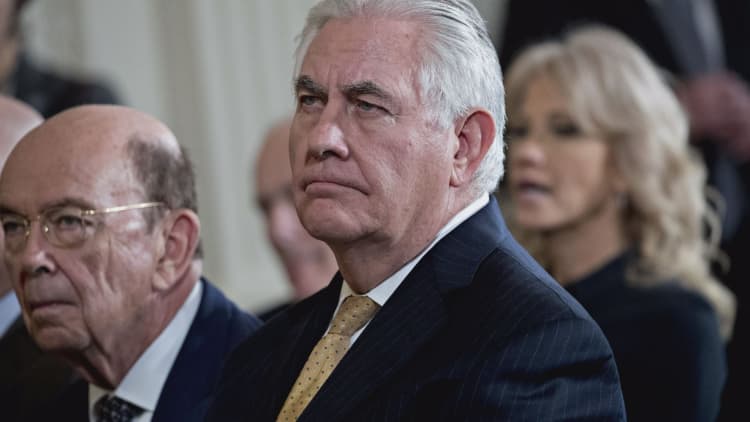Donald Trump appeared to back the UK's claims that Moscow was behind the attempted murder of a former Russian spy hours after the Kremlin angrily rejected the charge and demanded access to the details of the investigation.
The US president, speaking at an impromptu press briefing on the White House lawn, told reporters he planned to speak to UK prime minister Theresa May on Tuesday about the poisoning of Sergei Skripal and his daughter Yulia with a Soviet-era nerve agent.
"It sounds to me that it would be Russia based on all the evidence they have," Trump told reporters. "
As soon as we get the facts straight, if we agree with them, we will condemn Russia or whoever it may be." Mr Trump's comments came as he confirmed he had decided to sack Rex Tillerson, the US secretary of state, who on Monday night had led western condemnation of the attack on British soil that left the Russian double agent and his daughter critically ill.
Russian foreign minister Sergei Lavrov told reporters on Tuesday that accusations of Russian involvement were "nonsense". The UK ambassador was summoned for an explanation.
He added: "We are expecting the United Kingdom to reply to our request that we sent in accordance with the [Chemical Weapons Convention] to present the substance in question to us and to open the entire investigation to us, because it involves a Russian citizen," Mr Skripal's daughter.
Mrs May on Monday said it was "highly likely" that Moscow was involved in Mr Skripal's poisoning as the agent used came from a group of Russian-made chemical weapons called Novichok. She gave Russia until the end of Tuesday to provide a "credible response", warning that the UK could step up sanctions against President Vladimir Putin's government.
But Mr Lavrov rejected the British ultimatum and said Russia would only act under terms set by the Chemical Weapons Convention that give respondents 10 days to face accusations of producing chemical weapons used abroad.
Mr Skripal, a former Russian agent who passed secrets to Britain's foreign intelligence service MI6, and his daughter are in a serious condition after being taken ill in Salisbury, south-west England, on March 4.
Russia's foreign ministry warned that Moscow would retaliate against any British sanctions. "Any threats of the adoption of 'sanctions' against the Russian Federation will not be left without response. The British side must be mindful of that," the foreign ministry said.
Deputy foreign minister Vasily Titov said Russia had had no role in the poisoning and called the British government's accusations "openly provocative".
Claims of Moscow's involvement in the attack have only added to rising tension between the Kremlin and the west as Russia warned the US against intervening militarily to end the assault by Syrian government-backed forces on the rebel enclave of eastern Ghouta.
Nato and some European officials also offered public backing to the UK as attention turned to how western institutions would react to the assault. But the case risks exposing faultlines among the allies, with some European capitals already chafing at existing EU sanctions against Moscow while Mr Trump has still not imposed a fresh round of sanctions requested by Congress last year.
The UK also received statements of solidarity from leading figures in the European Commission and European Parliament.
Guy Verhofstadt, a former Belgian prime minister and leading European parliamentarian, tweeted on Tuesday: "We stand shoulder to shoulder with the British people. It must be made clear that an attack against one EU & Nato country is an attack on all of us."
Jens Stoltenberg, Nato's secretary-general, called the use of the nerve agent "horrendous and completely unacceptable". He said the western alliance was in touch with authorities in the UK, which he called a "highly valued ally".
Tension was increased between Russia and the west over the conflict in Syria when Valery Gerasimov, head of the general staff of the Russian Federation's armed forces, said Russia would retaliate if the US launched strikes on Damascus.
"In case the lives of our soldiers are under threat, the armed forces of the Russian Federation will take retaliatory measures both against missiles and against the delivery vehicles used," Ria Novosti and Interfax quoted Mr Gerasimov as saying.
Mr Gerasimov's stark warning came after Washington ratcheted up the pressure for decisive international action to end an assault by the forces of Syrian president Bashar al-Assad on eastern Ghouta, the rebel enclave on the outskirts of the Syrian capital.
Nikki Haley, US ambassador at the UN, told the Security Council on Monday that the US was prepared for unilateral action to end the Assad regime's shelling of eastern Ghouta. "It is not the path we prefer, but it is a path we have demonstrated we will take, and we are prepared to take again," Ms Haley said, according to Reuters.
On February 24, the UN Security Council unanimously called for a month-long ceasefire in Syria. But Syrian government forces backed by Russia have kept up their strikes on eastern Ghouta, which the Assad regime and Moscow claim are targeting "terrorists".
More from the Financial Times:
US business chiefs warn on dangers of protectionism
Donald Trump drops call to raise age limits on assault rifles
Welcome to Donald Trump's Hotel California
WATCH: Tillerson says poison used on ex-spy 'came from Russia'


